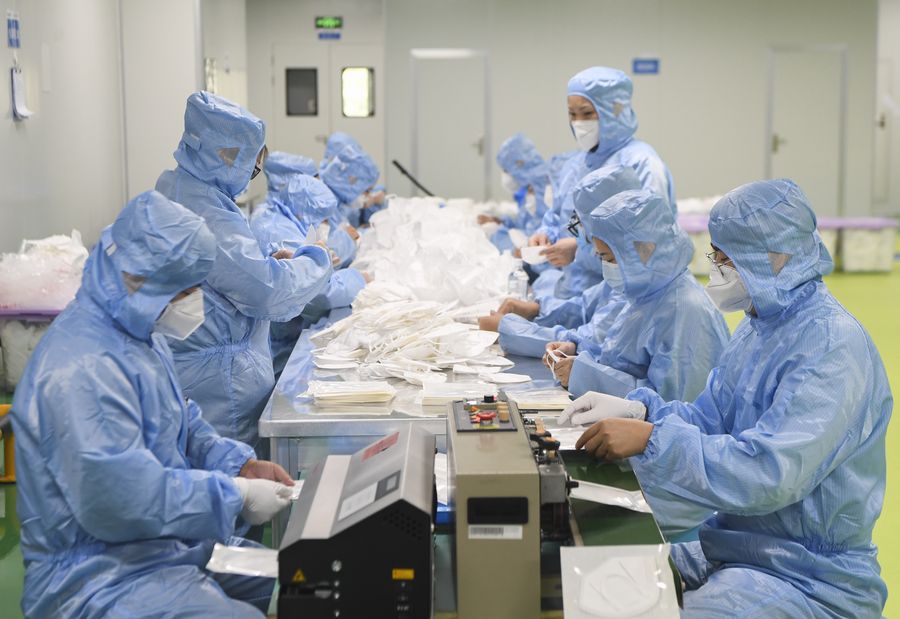
A press conference is held by the State Council Information Office in Wuhan, central China's Hubei Province, Feb. 20, 2020. Ding Xiangyang (2nd L), deputy secretary-general of the State Council, Lian Weiliang (2nd R), deputy director of the National Development and Reform Commission of China, and Yu Yanhong (1st R), an official with the National Health Commission, attended the press conference. (Xinhua/Xiao Yijiu)
Progress has been made in the fight against the novel coronavirus in Wuhan and Hubei Province at large, while some challenges still remain, according to officials.
WUHAN, Feb. 20 (Xinhua) -- China has achieved some positive results in the fight against the novel coronavirus in Wuhan and Hubei Province at large, although there are still some challenges, officials said Thursday.
Daily new confirmed and suspected cases have both dropped in Wuhan, the epicenter of the coronavirus outbreak, Ding Xiangyang, deputy secretary-general of the State Council, or the cabinet, said at a press conference Thursday in Wuhan.
"Our medical capabilities have also improved, and the number of discharged patients is rising steadily," Ding said.
Meanwhile, other cities in Hubei have also seen the number of confirmed and suspected infections decrease, boosting confidence for the prevention and control efforts, he said.
However, it is also necessary to understand that despite the positive results, challenges remain, including the large number of infections in Wuhan.
Altogether 29 foreign nationals in China had been infected with the novel coronavirus as of 6 p.m. Wednesday, Ding said.
Among the total, 18 patients have recovered and been discharged from hospitals. Nine are in quarantine and receiving treatment at hospitals, and two died of the virus, according to Ding.
Also at the press conference were Lian Weiliang, deputy head of the National Development and Reform Commission, and Yu Yanhong, an official with the National Health Commission.
The officials paid a silent tribute to medics and patients who lost their lives during the fight against the novel coronavirus outbreak.
"The severity of the epidemic and the vast transmission of the virus have posed unprecedented challenges and generated huge pressure on the entire society," Ding said.

Workers produce medical N95 masks at a mask production company in southwest China's Chongqing, Feb. 17, 2020. Medical N95 masks will be supplied to the novel coronavirus epidemic prevention frontline for medical workers. (Xinhua/Wang Quanchao)
SUPPLY GUARANTEE
The key supplies for medical personnel on the front line to fight the novel coronavirus epidemic are guaranteed, and the supplies of living materials are basically abundant, Lian said.
On Feb. 19, a total of 336,000 N95 masks and 133,000 protective suits were collected across the country and supplied to Hubei, he said.
With the growing number of medical workers sent to Hubei to aid the fight against the virus, as well as the confirmed and suspected patients admitted to hospital for treatment, there will be a huge demand for medical supplies.
There are still some structural problems in the varieties of medical material provisions, according to Lian.
Meanwhile, to increase the number of hospital beds to take in more patients, Wuhan has built 11 makeshift hospitals and set up over 400 medical quarantine sites, Ding said.
The designated hospitals, makeshift hospitals and quarantine sites in Wuhan are expected to offer about 70,000 hospital beds, Lian added.
Since the coronavirus outbreak, the central government has subsidized over 700 million yuan (nearly 100 million U.S. dollars) to improve the medical treatment capability of the province.
In addition, about 2,000 tonnes of pork have been transported to Wuhan from other regions of the country to increase local supplies. More tonnes of staple foods, meats, vegetables and other food will be provided to Hubei.

Medical staff work at a traditional Chinese medicine pharmacy in Weinan City, northwest China's Shaanxi Province, Feb. 20, 2020. (Xinhua/Tao Ming)
COMBINATION OF CHINESE, WESTERN MEDICINE EFFECTIVE
The combination of traditional Chinese and Western medicine in treating COVID-19 is proved effective, Yu said.
The method can rapidly improve the condition of patients with mild symptoms such as fever, cough, sore throat, weakness and lack of appetite, and cut the duration of hospital stays, said Yu, who is also deputy head of the National Administration of Traditional Chinese Medicine.
Experts also find that the combination can help prevent mild symptoms from developing into severe and critical conditions, thus reducing the death rate of the disease, she noted.
A study on 102 mild cases showed that the clinical symptoms of those receiving the combined treatment disappeared two days sooner than the control group, and the recovery rate improved 33 percent, Yu explained.
She also noted that traditional Chinese medicine can effectively improve the number of lymphocytes, an indicator of patient recovery.
In another study on cases of severe conditions, the patients receiving the combined treatment stayed an average of over two days shorter in hospital than the control group, with multiple indicators improving.
"In the future, we will further improve the plan of traditional and western medicine treatment to give it a greater role in saving the patients," Yu said.
Public safety and health must be the priority in the fight against the coronavirus, Ding said.
"We must clench our teeth and fight the coronavirus with greater confidence, stronger determination and more resolute measures," he said. "We will not stop until we win the battle against the virus." ■



